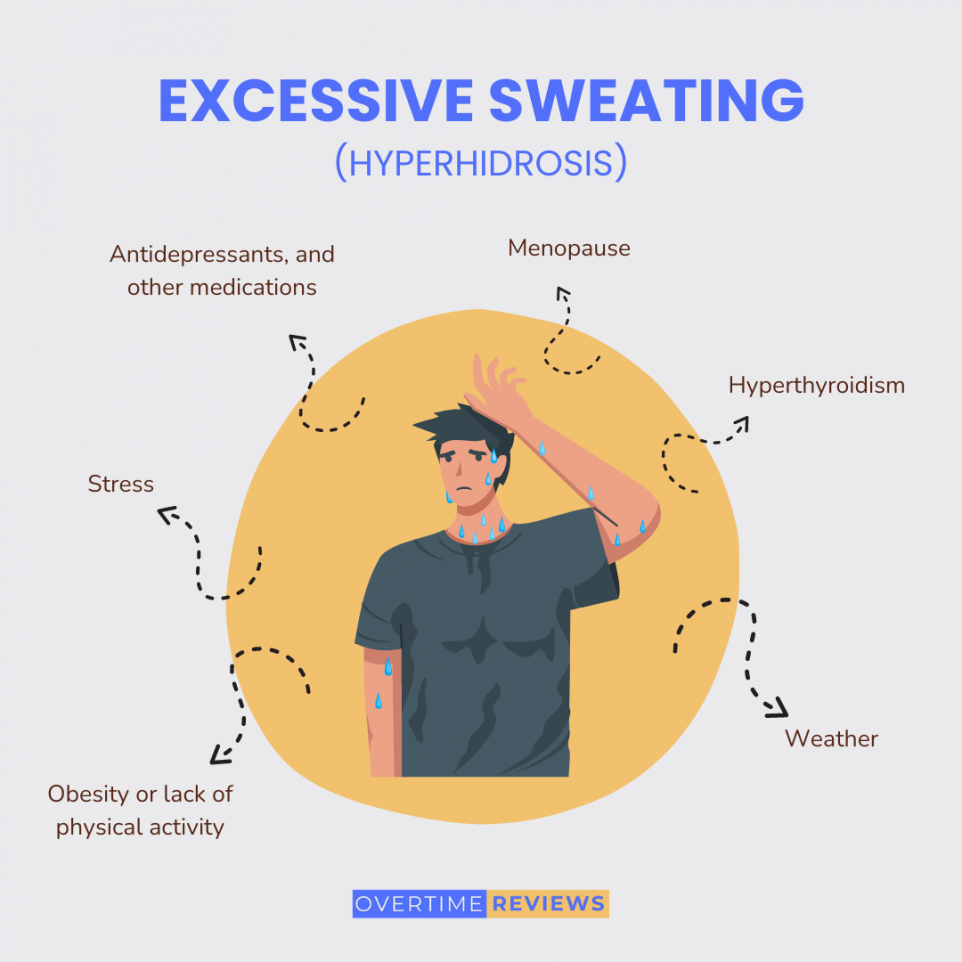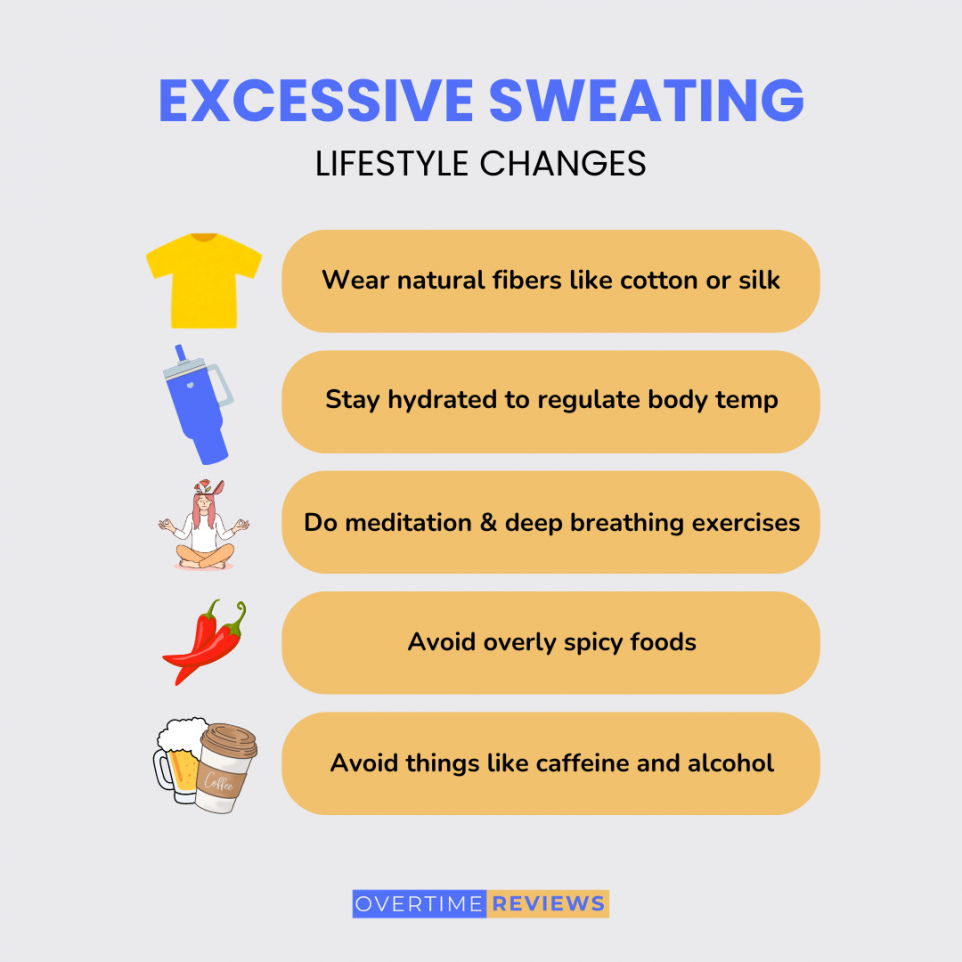Why Do I Sweat So Much? The Secrets To Dealing With Excessive Sweating

Sweating is a natural part of the body’s temperature regulation process, but for some people, it can become a major problem. Excessive sweating, or hyperhidrosis, is a condition that affects millions of people worldwide. If you’ve been struggling with persistent and excessive sweating, you’re not alone.
We know living with excessive sweating can be embarrassing and even distressing. What’s good is that there are effective treatments available to help you deal with the issue and get your life back on track. In this post, we’ll explain the causes of excessive sweating, the available treatments, and tips to help manage the condition. We hope that by the end of this post, you’ll feel more empowered and prepared to tackle your excessive sweating issues.
What Is Excessive Sweating?
Most of the time, sweat is just a mix of water and salts, with a tiny bit of fats, proteins, sugars, and ammonia thrown in for good measure. Now, you’ve got two main types of sweat glands handling this cooling business: eccrine and apocrine. Eccrine glands, which you have from birth, are spread all over your body and pump out mostly water. These are your cooling champs. Apocrine glands kick in around puberty and are found in your armpits and groin, secreting a thicker, oilier type of sweat.
But here’s where it gets tricky: imagine sweating heavily even when it’s not hot, and you’re not mid-spin class. We’re talking about sweaty palms during a meeting or drenched socks when you’re just chilling. This could be a sign of hyperhidrosis—a condition where the body sweats excessively without the usual triggers like heat or physical activity.
About 15.3% of people in the US deal with hyperhidrosis, sweating profusely from their face, underarms, feet, or hands at least once a week in situations that normally wouldn’t call for it. The cause? Well, primary hyperhidrosis is often caused by overactive nerves signaling your eccrine glands non-stop, even when you don’t need cooling help. If it’s secondary hyperhidrosis, the excessive sweating might be due to underlying medical conditions like diabetes or certain medications such as antidepressants.
Causes of Excessive Sweating

When sweat shows up uninvited and in copious amounts, it can be due to a myriad of triggers. Stress and anxiety top the chart, being the culprits behind most excessive sweating cases. It’s a throwback to our cave-dwelling days when the ‘fight or flight’ mode was a daily drama, and sweating was part of the physical prep for action.
Then there’s the weather. High temps and humidity can make you feel like you’re melting because sweating doesn’t quite cut it for cooling you down due to slower evaporation rates. Physical activity, obviously, gets your sweat glands going too, which is normal. But if you’re just taking a stroll and find yourself excessively sweating, it might raise a brow.
Diving deeper, medical conditions like hyperthyroidism stir up a storm in your body, cranking up your metabolism and heat production, which makes you sweat more as your body attempts to cool down. Menopause brings its own sweaty surprises with fluctuating hormones making your body think it’s hotter than it is.
Medications aren’t off the hook either. Some antidepressants and blood pressure meds can trigger your internal sprinkler system. And let’s not skip over obesity, infections, or even what you eat. Yep, that spicy taco can turn up your body’s heat just as much as a fever can.
What’s really intriguing is primary hyperhidrosis, where the sweat show is all day, every day, without any apparent reason, and it often starts in childhood. It’s not about the weather or your mood; your body just goes into overdrive with sweat production, often symmetrically affecting both sides of your body like your palms, feet, or armpits.
Lifestyle Changes To Reduce Sweating

Studies show that people with hyperhidrosis are 30% more likely to get skin-related infections, which is why hygiene plays an important role in managing the condition. There are several other lifestyle changes that can help reduce excessive sweating, including:
- Wearing natural fibers such as cotton or silk can help keep skin dry and reduce odors caused by bacteria on the skin.
- Staying hydrated helps regulate body temperature and prevent overheating, which leads to increased sweat production.
- Eating spicy foods should be avoided as they increase internal heat levels, resulting in more sweat production.
- Developing stress management techniques can also help reduce stress-related sweating episodes.
- Meditation, deep breathing exercises, yoga, and regular exercise can help relax the body and mind while decreasing stress hormones like cortisol that lead to sweat production.
- Avoiding things like caffeine and alcohol throughout the day may also help reduce sweating since they both affect your nervous system.
Treatment Options for Excessive Sweating
Excessive sweating can be diagnosed by a doctor through medical testing such as a blood test or an iodine starch test. After diagnosis, there are several possible treatments for excessive sweating that may provide relief.
One treatment could be an antiperspirant containing aluminum salts that block sweat glands and reduce the amount of sweat produced. Prescription antiperspirants such as Drysol contain higher concentrations of aluminum salts than regular antiperspirants and require less frequent use.
If you do not want to go down the route of antiperspirants, given the chemical makeup, you might want to incorporate a deodorant into your hygiene routine. If you are looking for a semi-permanent remedy, botox injections are another option. These block the nerves responsible for activating sweat glands for up to four months at a time.
Iontophoresis is another treatment option involving electric currents sent through water or gel to temporarily shut off sweat glands in certain areas. If all other options fail to provide relief, prescription medication or surgery may also be an option for severe cases of excessive sweating.
Trustworthy Insights for You
With years of combined expertise in online publishing, OvertimeReviews embodies the lessons learned from SEO strategies to paid advertising experiences. We've navigated the highs and lows, and our goal remains clear: to equip readers with comprehensive information they can trust.
